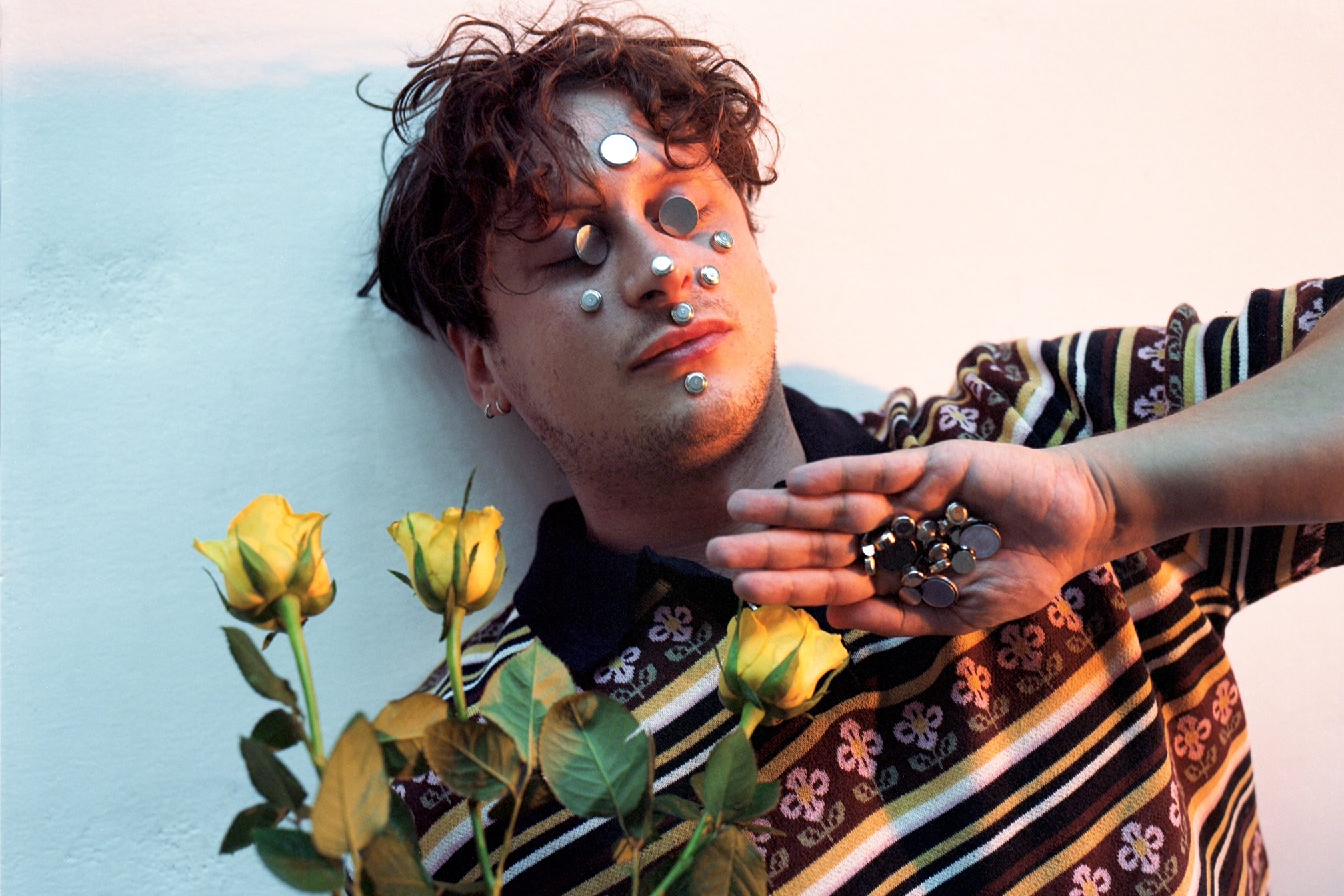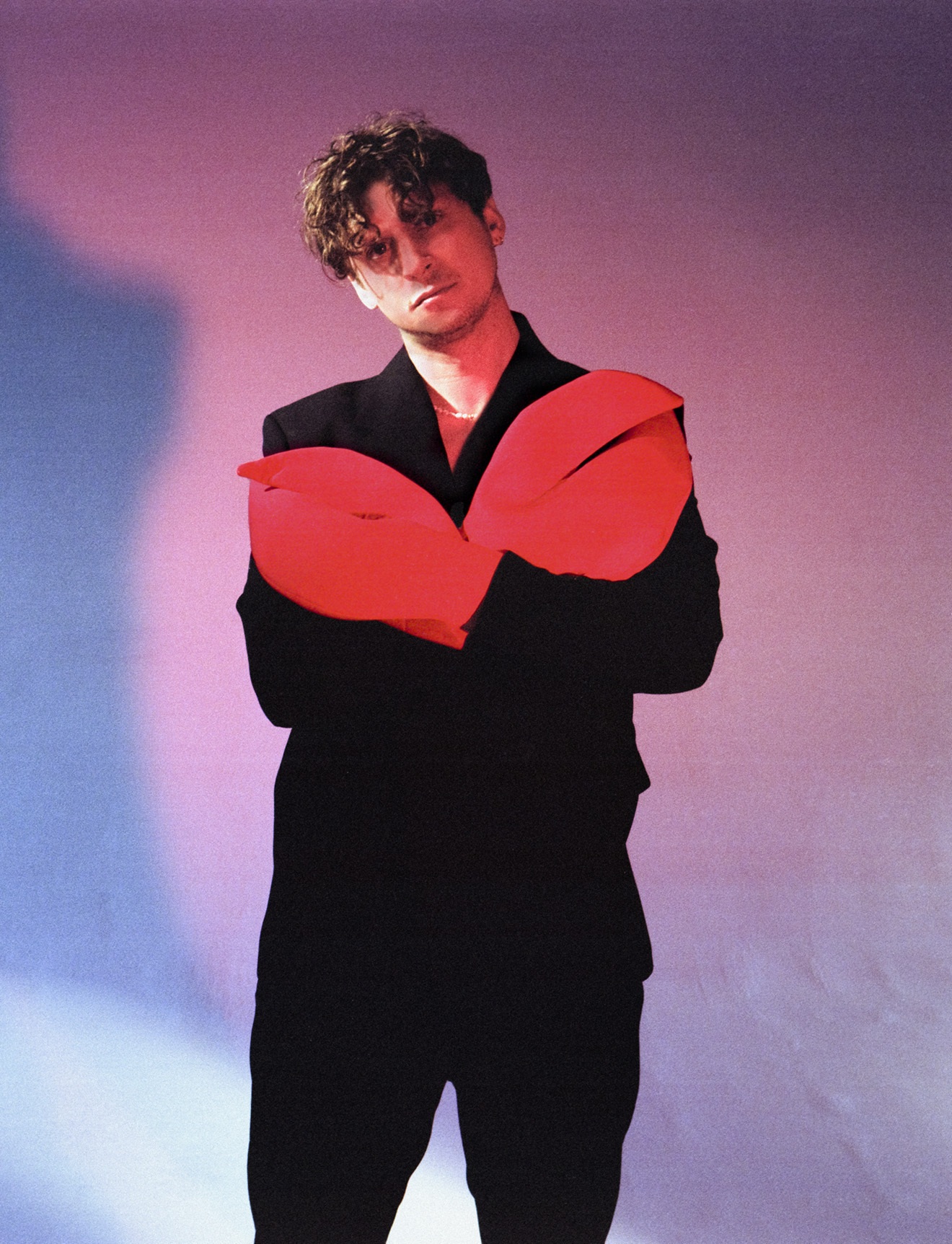 Features
Features
Embracing emotional vulnerability is powering Barry Can't Swim's success
Upon the release of highly anticipated debut album ‘When Will We Land?’, Barry Can't Swim speaks to Arielle Lana LeJarde about his fast-rising popularity and accepting his emotions
Barry Can’t Swim has been attracting a lot of attention recently, and not just because he’s surrounded himself with toys and colorful blocks in the artwork for his debut album or danced alongside ravers in fish masks at his set in Mixmag’s Lab LDN. His first EP ‘Amor Fati’ came out in 2021, showcasing a flair for creating emotionally resonant, jazz-infused house that quickly won over Ninja Tune, signing him for a follow-up EP on sub-label Technicolour the next year. Now his debut LP ‘When Will We Land?’ has dropped on the main label as one of the most anticipated releases of 2023, acheiving the rare heights of a Top 5 placing in the midweek UK albums chart for an independent electronic artist, hot on the heels of a North American tour.
On the sunny Thursday morning that we meet in early October, at 9:AM to be exact, he’s dressed in a fresh and simple uniform: an oversized green checkered shirt, white balloon trousers, and classic black Chuck Taylors. Even so, he still sticks out from the bustling New York foot traffic when he grabs me from the front of the city’s Radio Hotel.
The first thing he wants to do is get coffee. He's not normally a morning person, but his chaotic touring schedule allows for the early meeting time. And even though he has to catch a flight to Toronto straight after, he seems more than happy to go on a 30-minute tangent about our mutual love of jazz music. It's clear then that his uncomplicated demeanor isn't out of fatigue, but his easygoing approach to life, music, and the music business, stems from his unwavering gratitude for the position he’s reached.
"I'm very lucky," he says. "I think with anyone who's had any success, no matter how talented you are, there's a massive amount of luck. I really believe that and I think anyone who thinks otherwise is kidding themselves. That goes for anything as well, not just music."

The Edinburgh-born artist, real name Joshua Mannie, didn't come from a musical family. His first experience with music was his grandfather gifting him a harmonica as a child. It became a recurring gift because the instrument would always go "missing," although he realises while relaying this story that his mum was just most likely annoyed at the noise. Nonetheless, music would go on to be the one constant in Mannie's life—and with his family's full support.
With a slight disdain for authority and a predilection for breaking the status quo, Mannie wasn't the best school student. To him, school was too rigid, and he was the type to take risks. "You've got to be willing to be vulnerable and fail and be fine with it," he says. "That's what school doesn't teach you. School teaches you to conform, and that doesn't ever bode well for anyone who's going to do anything particularly creative. I didn't know that at the time. At the time, I just thought, 'God, I'm a shit kid.'"
Read this next: Why electronic music lessons should be taught in secondary schools
That ambition and independence led to his foray into making electronic music. With a (mostly self-taught) background in playing the piano, guitar, bass, drums, and the didgeridoo, as well as his exposure to playing almost every part in indie bands growing up, Mannie tried his hand at producing while attending the Edinburgh Napier University.
He also used his time studying —which happens to be the period when he discovered his passion for electronic music—to prove himself wrong. Feeling like he had unfinished business, he worked hard to excel in his classes and earned a degree in popular music. As the first in his family to go to university, he took it upon himself to also enroll in courses that could lead to a more "realistic" career path. For him, that meant taking a few modules in music business. While a career in music was always the goal, Mannie also understood the chance of becoming a touring artist wasn't given to everyone.
"I didn't expect I was gonna be doing this for a living," he says. "I didn't expect to be in New York playing shows and shit. I didn't think I was gonna happen."

Whether or not he thought a degree in music was sensible, he put it to good use. His life in Edinburgh—slinging produce at the meat and fish market and bartending at his friend's dad's local bar—was uprooted when he got an internship at a record label in Glasgow, before making the move to London, where he's based now. This is also when he began to make music under the Barry Can't Swim moniker, releasing a single then EP with local labels Part Four Records and Shall Not Fade respectively, before Ninja Tune came calling.
Despite the rapid success, Mannie continues to take a communal approach to growth. Rory Dewar, an artist who conceptualised some of the early Barry artwork, was enlisted for the entire creative direction of ‘When Will We Land?’. Mannie notes Dewar will also be creating the visuals for the upcoming album tour. The producer has also been long-time friends with somedeadbeat, the poet featured on album cut ‘Deadbeat Gospel’. They hadn't seen each other in six years before meeting again at one of Mannie's shows in Dublin, the same night they serendipitously recorded the vocals for the song.
"The man was destined for big things," somedeadbeat says. "He is a big character with an even bigger heart. To be featured on the album is an honour and I can honestly say, this album will have people dancing for generations to come."
Read this next: Raveheart: How house music exploded in Scotland
Now releasing his debut album, Barry Can't Swim presents ‘When Will We Land?’, a diaristic sonic scatter of Mannie's influences, experiences, and feelings. Demonstrating his prowess on the piano, the instrumentalist begins the record with a series of arpeggiating keys that immediately invoke a sense of childlike wonder. That prepares us for the remainder of the album's unpredictability. ‘When Wlll We Land?’ is nestled in Afro house's warmth with pockets of groovy jazz rhythms and high-energy 2-step hooks, and it's tied together by the undemanding melodies that allow each track to effortlessly flow into the next. The record is a product of its time (although it does feel more like a summer album than it does autumn). It's a mixture of sombre self-reflections, bursts of fervid emotion, and opportunities for escapism in moments most needed.
The project pays reverence to a few influences. He admires the unpretentious cheekiness of Afrobeat pioneer Fela Kuti, the simple melodies of The Beatles, and the trailblazing innovation of Jai Paul—all of which clearly made an impact on ‘When Will We Land?’. While Mannie says he doesn't see himself as someone who "massively pushes boundaries," his ability to pull back and be vulnerable—both in his productions and in person—is part of why he's grown at the speed in which he has.
"I honestly am quite an emotional person," Mannie says. "I've always disliked that about myself. I don't think I've ever perceived it as a good thing. But now that I'm doing this and writing music for a living, I'm starting to see it more as a hidden superpower."
‘When Will We Land?’ is out now via Ninja Tune, buy it here
Arielle Lana LeJarde is a freelance writer, follow her on Twitter


